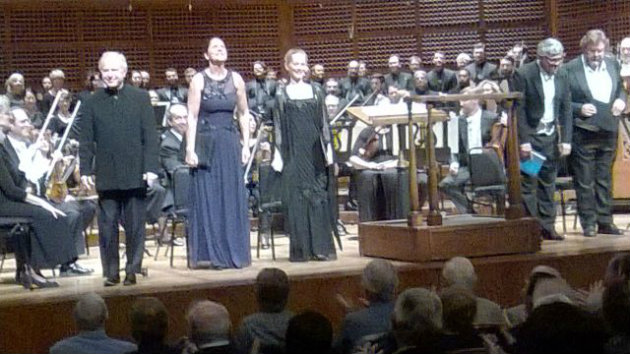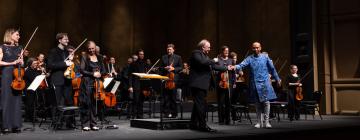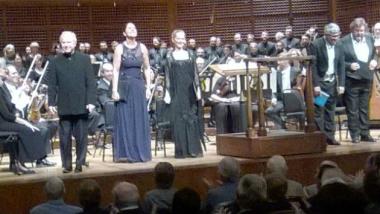
András Schiff, among the most prominent and respected pianists of our time, has been conducting orchestras in Europe for some time, but here, it's still somewhat of a novelty to see him on the podium.
Based on what transpired in Davies Hall on Wednesday, Oct. 7, I fervently hope Schiff, the conductor-pianist, will pause often enough in his globe-circling travels to become a regular here in that capacity.
The concert, which is repeated on Friday and Saturday, is among the most memorable in recent S.F. Symphony offerings: The program is unusual and rich, performances are of the highest standard, we meet four notable singers in their San Francisco debut, and through it all, there is the "Schiff touch" of an elegant, intimate, now playful, now dramatic, always sincere and honest sound.
There is only one exception to what otherwise would be an unqualified rave, so let's get that out of the way: The order of works for the evening makes no sense.
Opening with Mozart's Piano Concerto No. 27, the program calls for a 20-minute intermission after the half-hour-long work, followed by the crowning glory of the concert, Haydn's majestic Mass in D Minor (the "Nelson Mass"), then another intermission — instead of ending on that high note — and a group of Schubert lieder.
Quiet, sorrowful songs after the rafter-shaking Nelson Mass would be a poor enough arrangement, but here is the worst of it: Before the evening ended with a reprise of "Ständchen" (Serenade), there were magnificent, searing performances by bass Robert Holl of "Totengräbers Heimwehe" (Gravedigger's Homesickness) and "Der blinde Knabe" (The Blind Boy). Even if you don't necessarily covet a happy ending at the symphony, leaving the hall with this in mind is a... curious decision:
Abandoned by all, with Death my only kin,
I linger at the edge, a cross in my hand,
and stare with yearning down
into the deep, deep grave!
But on to everything (else) great — the 1791 Mozart Piano Concerto in B-flat Major served as the ideal introduction to Schiff for those who heard him as a pianist for the first time. He played the serenely beautiful work, characterized by late-Mozart simplicity, with the effortless perfection that has made the "Schiff brand" treasured for his Bach recitals. Occasionally rising from the piano bench, Schiff conducted the small orchestra — Nadya Tichman serving as concertmaster — with economy and his usual understated authority, devoid of posing. Unlike rare orchestral bloopers in the Haydn — such as a premature entry by a violin — all was right with the Mozart... and the world.
Unlike rare orchestral bloopers in the Haydn — such as a premature entry by a violin — all was right with the Mozart... and the world.The Nelson Mass, originally called Missa in Angustiis (Mass for Troubled Times), was written in 1798, a time of Napoleonic victories and turmoil, may be Haydn's greatest single work. (The association with Lord Nelson and the English fleet's defeat of Napoleon's navy at the Battle of the Nile came after that military feat.)
As conducted by Schiff, with the brilliant participation of Ragnar Bohlin's S.F. Symphony Chorus, this powerful liturgical celebration was pure joy. Schiff controlled forte passages so they never became noisy, the (relatively few) lyric portions sounded crystalline and diction remained excellent throughout.
Following performances in Europe, Schiff brought with him four soloists for the Mass, all making their San Francisco debut.
Soprano Anna Lucia Richter (who has the lion's share of the work) and bass Robert Holl were both amazing. Their voices filled the big and difficult Davies Hall - hers like a trumpet from a small frame and his beautifully controlled, projected superbly even in pianissimo when later performing the Schubert songs.
Contralto Britta Schwarz and tenor Werner Güra were also welcome new voices — both have relatively little to do in the Haydn, but performing impressively in the Schubert songs.
Schwarz and the women of the Symphony Chorus sang "Ständchen"; she and the men of the chorus closed the evening with a reprise of the song. Güra sang "Widerschein" (Reflection) and "Fischerweise" (Fisherman's Song). Richter followed with "Das Lied im Grünen" (Song of the Greenwood) and "Im Frühling" (In Spring), before Holl's rendition of those two beautiful downers.

